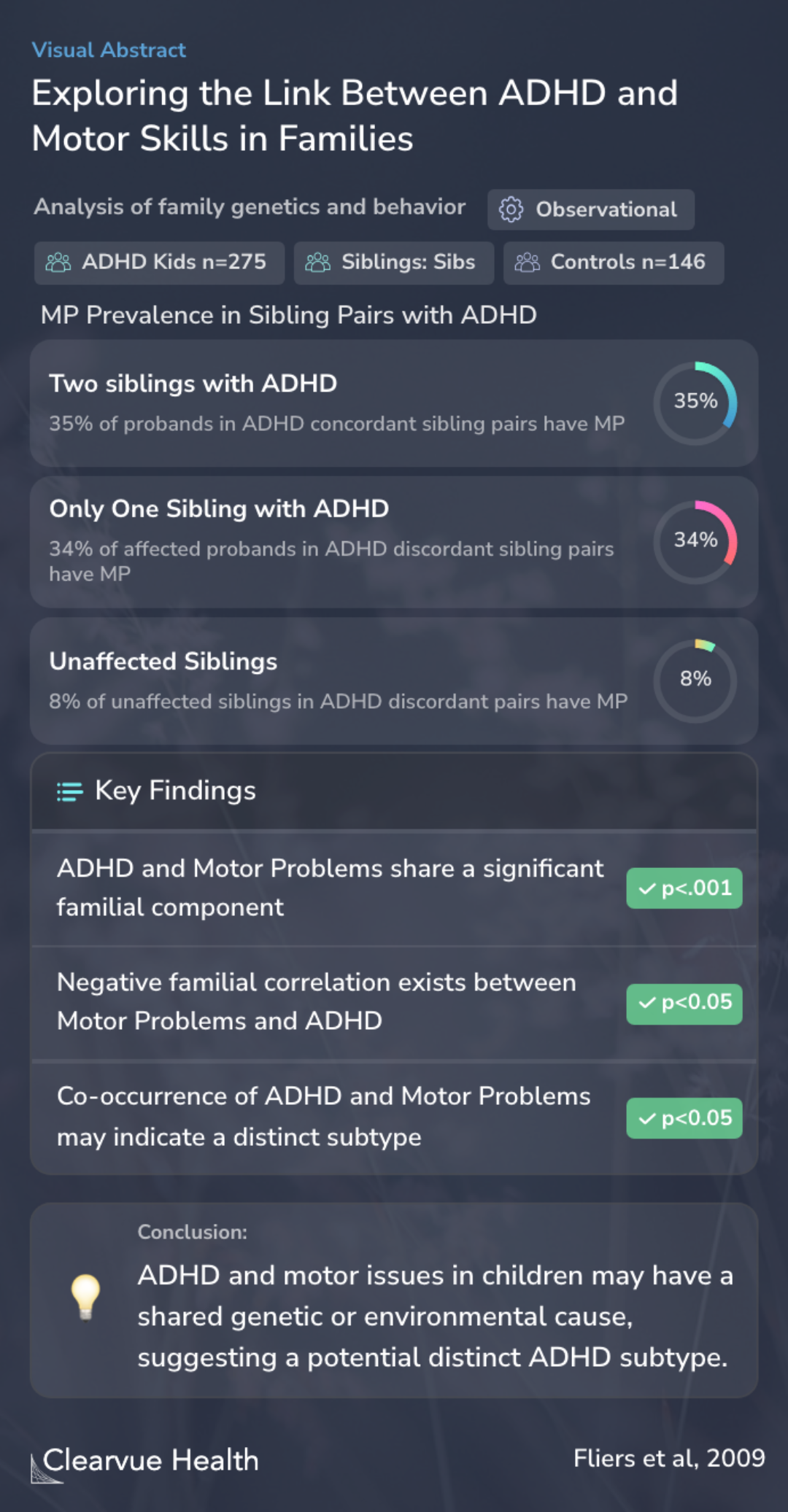ADHD and poor motor performance from a family genetic perspective
Exploring the Link Between ADHD and Motor Skills in Families
Fliers E, Vermeulen S, Rijsdijk F, Altink M, Buschgens C, Rommelse N, Faraone S, Sergeant J, Buitelaar J, Franke B

Objectives
The paper examines a possible shared cause behind Attention-deficit/hyperactivity disorder (ADHD) and motor problems (MPs) in children. This investigation was conducted within the Dutch cohort of the International Multicenter ADHD Genetics study, which included 275 children diagnosed with ADHD, their siblings (whether they had ADHD or not), and 146 unrelated children who did not have ADHD.
Background: Attention-deficit/hyperactivity disorder (ADHD) is frequently accompanied by motor problems (MPs). We investigated a possible shared etiology between the two traits in the Dutch sample of the International Multicenter ADHD Genetics study comprising 275 children with ADHD and ...
Methods
The study employed exploratory data analysis and bivariate structural equation modeling to assess the familial links of motor problems as rated by parents (using the Developmental Coordination Disorder Questionnaire, or DCD-Q) and teachers (using the Groningen Motor Observation Scale, or GMO). This approach helped to identify whether the occurrence of motor problems and ADHD within families was influenced by genetic or environmental factors. Furthermore, the study delved into the characteristics of these familial links by focusing on the siblings of children with ADHD, whether they were affected by the condition or not.
Method: Exploratory data analysis and bivariate structural equation modeling were used to estimate the familiality of MP rated by parents (Developmental Coordination Disorder Questionnaire [DCD-Q]) or teachers (Groningen Motor Observation Scale [GMO]) and to determine the familial and en...
Results
The results highlighted that children with ADHD had significantly more motor problems than their siblings who did not have ADHD. These unaffected siblings, in turn, exhibited more motor problems compared to the control group of unrelated children without ADHD. The study found that the family-related component of motor problems, as measured by the DCD-Q and GMO scales, accounted for 47% and 22% respectively. A notable finding was the negative familial correlation between motor performance measures and ADHD, with values of -0.38 for DCD-Q and -0.40 for GMO, suggesting that the relationship between motor problems and ADHD within families might be influenced by factors other than genetics alone. These insights suggest that the coexistence of ADHD and motor problems could signify a distinct subtype of ADHD, rather than merely indicating a higher severity of the disorder.
Results: The ADHD-affected children had significantly more MP than their unaffected siblings, who in turn had significantly more MP than the control subjects. The familial component of MP measured by DCD-Q and GMO was 47% and 22%, respectively. The familial correlation between motor perf...
Conclusions
The conclusions drawn from the study suggest that ADHD and motor problems might share a common genetic or environmental foundation. This shared basis could point to the existence of a distinct subtype of ADHD characterized by the co-occurrence of these two conditions. However, the paper emphasizes the need for further research to solidify this hypothesis.
Conclusions: Attention-deficit/hyperactivity disorder and MP have a common basis that may be due to genetic factors and/or shared environmental factors. Attention-deficit/hyperactivity disorder accompanied by MP may behave like a distinct subtype of ADHD, but more research will be needed...
Key Takeaways
Context
The role of motor skills in ADHD symptoms has been underscored by other research, such as the study by Tseng MH et al. (2004), which explored the connections between motor skills and attention, impulse control, and activity levels in children with ADHD. This research found significant differences in motor skills and impulse control in children with ADHD compared to their peers, suggesting a strong influence of attention and impulse control on motor skills in these children.
Further studies, like the one by Rommelse et al. (2008), have delved into the genetic connections between ADHD, IQ, and executive functions. Their findings revealed a strong link between IQ and executive function among siblings with ADHD, although these factors were unrelated to each other, indicating that ADHD and difficulties in self-control do not necessarily imply a lower IQ but are associated with a higher risk of ADHD symptoms in siblings.